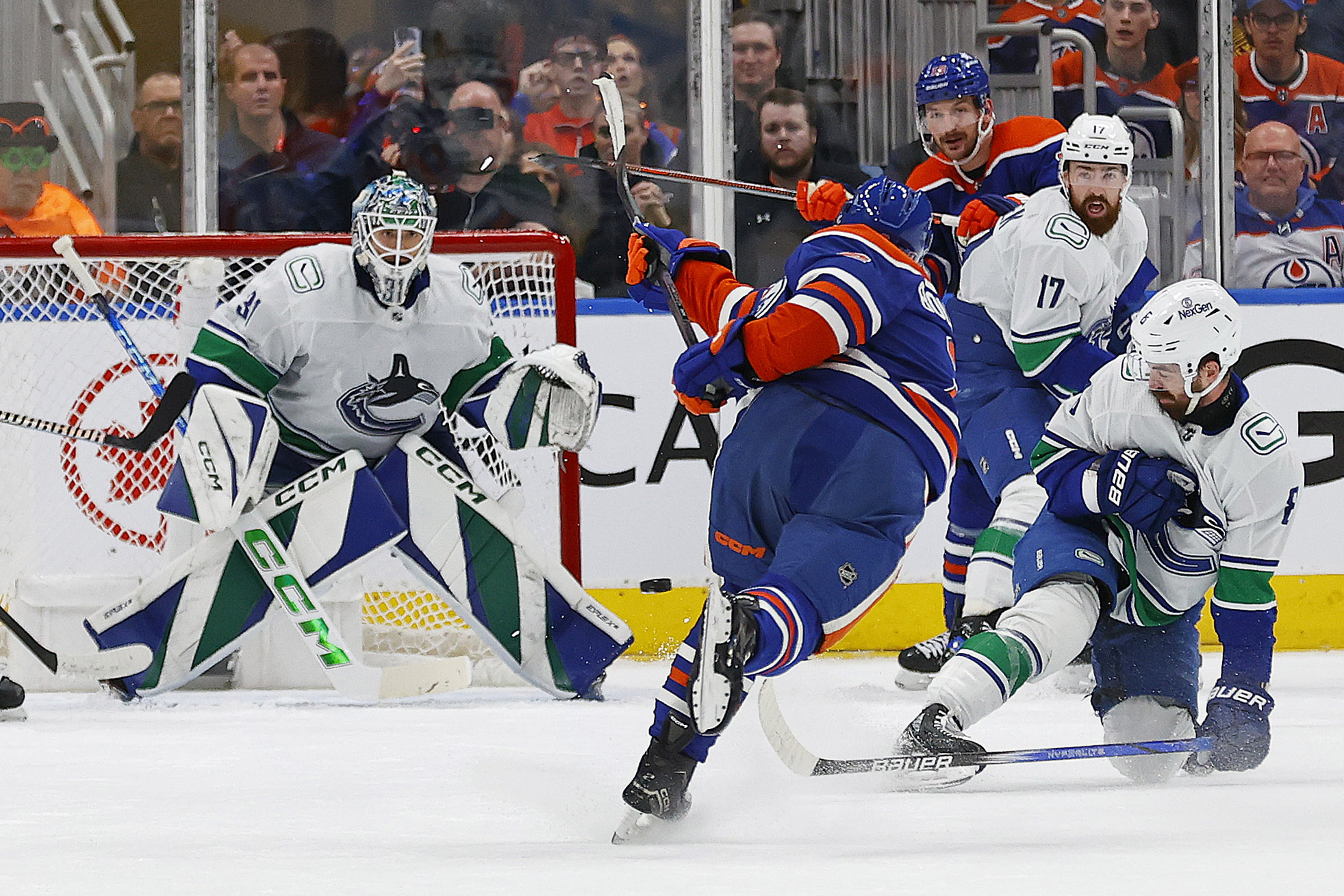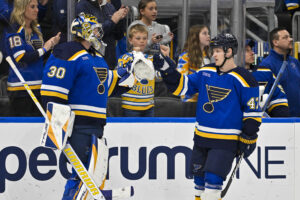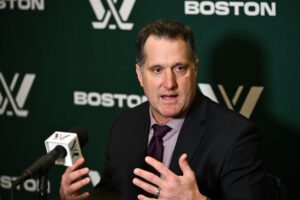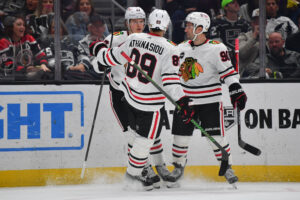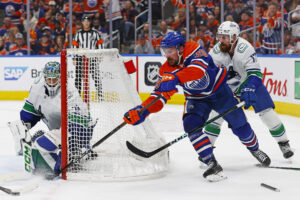Though the Vancouver Canucks season ends with a loss, it can only be considered a success. One game away from reaching the Western Conference Final is farther than anyone expected. That’s true of predictions at the beginning of the year and those at the beginning of the playoffs. Now comes the Canucks free agent list, with big decisions to be made.
Canucks Season Ends Low, Fans Still on High
The expectations for Vancouver have been a talking point all year – at best, a narrow third place in their division. At worst, finishing ahead of only bottom-feeders San Jose and Anaheim. In typical Canucks fashion of late, too bad for playoffs, too good to draft local Wunderkind Macklin Celebrini. Nine months ago, President of Hockey Operations Jim Rutherford said the team would make the playoffs “if everything goes right.”
Just about everything went right. Not perfectly, but right. Andrei Kuzmenko only made it half the year before being moved, and Elias Pettersson‘s “very noisy” season included public negotiations and a private injury. Phil Di Giuseppe couldn’t hold on to a top-line spot, but no one really expected him to. Thatcher Demko‘s injuries hurt the team’s season and post-season. Otherwise? That was a pretty darn good year.
The difficulty with having what was clearly an “interim season” is showing itself now. The Canucks, by all evidence, made several moves to improve the team’s character. That means older veteran players on short contracts who need to work hard to stay in the league. When those same veterans outplay their contracts, though, it can make for hard decisions.
The team took advantage of their surprising start, bringing in top-end skill in trades. The result is that Canucks season ends with positive feelings, but also more questions than answers. More specifically, questions around the Canucks free agent players.
The Big Free Agent Questions for Canucks
There are two ways to improve a team: heighten the ceiling or raise the floor. The Canucks had good top-end skill, but never found the right mix to support it. Rutherford and General Manager Partik Allvin worked on rebuilding the defence and bringing in those bottom-six players. The floor was raised.
As the year went along, they realized that not only was the floor raised, but there was a chance to catch fire. An abnormal streak of good health kept players on the ice and the Canucks season ended with multiple players reaching career highs. The goal now is to not only repeat that success as a team, but improve on it.
In Goal
The easiest position first. In the course of a normal career, a rookie goaltender will start in the minors and his play will force management’s hand. He’ll be tried at backup and prove he can withstand the pressure of NHL scrutiny and skill of NHL shooters. Then, if he has the skills to match, he’ll make a career as a steady backup or push out the current starter.
Artūrs Šilovs is well on his way, even if he used the playoffs as a shortcut.
Casey DeSmith is a good, NHL-level backup who can sub in as a starter. As such, he’s earned his paycheque. But next year’s probably won’t be coming from Vancouver. Šilovs has pencilled in his spot behind Demko on the 2024-25 roster. Given Demko’s spotty injury history, Šilovs will get his chance to prove he can start in the regular season soon enough.
What his contract will cost and for how long is a question. A spanner in the works could be his waiver status – he’s exempt this season, and the team would love to have that “free” call-up. Having a veteran as backup in the NHL with Šilovs on tap is a luxury the Canucks will want to keep. This management has classically hard negotiators, so they could get a lower price or longer term in exchange for guaranteeing his start in the NHL.
Nikita Tolopilo should get plenty of work in Abbotsford, though if Šilovs doesn’t return Vancouver will want to bring in more experience. One more WHL season for Ty Young wouldn’t go amiss.
Am I Blue(liners)
If you overlook Filip Hronek‘s four games, the Canucks had two regular defencemen carry over from 2022-23 to 2023-24. Quinn Hughes and Tyler Myers are what remain from two seasons ago. Noah Juulsen hardly counts after his 12 games in 2022-23, but if you want to include him, he’s there. That overhaul was the primary cause for Vancouver’s improvement, certainly, but at a cost.
As of now, the Canucks have three NHL defencemen signed for next year. Not included is the terribly unlucky Guillaume Brisebois, expected to finally start a season with Vancouver. Brisebois missed all but eight AHL games this year due to injury. He still has a contract for 2024-25, and the team is very familiar with him, so he should have a step on the competition this season.
The Canucks had three big men playing big roles by the time the playoffs rolled around. Carson Soucy brought his disruptive play to short-circuit entries – when he was healthy. The Canucks free agent defencemen are a hard question. Nikita Zadorov rapidly became a fan favourite with big hits and plenty of intimidation. And the oft-maligned Myers had his best year in Vancouver offensively and overall.
No Unrestricted Entry
Myers is possibly the most interesting of the team’s unrestricted free agents, if not the best. He was a vital part of the Canucks penalty kill, and with the team not needing him for offence played the best defence of his career. He’d like to stay, but he’ll need to take a lot less than his current $6 million.
Zadorov is the riskiest signing for the Canucks. A huge fan favourite – teams do want to sell tickets – he’s on his fifth team in eleven years. Over his career, he’s a 20-point scorer and a bit of a wild card in his own end. He’s a third-pair+ defenceman, and how much can a team afford to spend on those? He had a great playoff run, but that isn’t the regular season.
It’s easy to imagine a team giving the 29-year-old an offer well beyond what he should be paid because of how good he looked in Rick Tocchet‘s system. His mistakes were cut to a minimum and his short-term production went through the roof in the playoffs. He’s very tempting and the Canucks might have to let him go because of it.
Ian Cole is an odd case of one week making his reputation. He had a disastrous three games against the Edmonton Oilers, with unlucky bounces going in off him or deflections around him and into the net. But what shouldn’t be ignored is that every defenceman who played with him outside the top two played better. Despite his age and theoretical third-pair status, he improved everyone else’s play.
Cole might not be up for a multiple-year contract at 35 years old, but seeing him re-sign wouldn’t be a surprise. It might not be with Vancouver, though.
No Restricted Entry, Either
Then there’s the curious case of Filip Hronek. An excellent partner with Hughes, his scoring dropped off in the second half of the season. Despite that, the pair was one of the most dominant in the league and he was a huge part of Hughes’ 92-point season. Hronek’s 48-point year was plenty good, but his first playoff goal – and second point – came in their last game.
Hronek’s 26 years old, plays the right side, and just had the best season of his career. He could well be another team’s top defenceman, and if he wants to be paid like one he’ll likely be traded to such a team.
Frontin’
Though it’s less obviously dramatic than the defence, how many Canucks free-agent forwards stay next year can determine their success. The acquisition of Elias Lindholm for the classic “3-P” deal – pick, player, prospect – was looked at with some suspicion early. He started his Canucks tenure with a two-goal game, but it was downhill from there. Getting injured late in March didn’t reassure fans.
Once the playoffs started, though, it was a different story. His rock-solid defence and contributions on offence swung his value back up, and don’t think he and his agent don’t know that. The Canucks want to keep him, making their strength at centre a key part of the team. He will want a big boost from his bargain price of less than $5 million per season.
Dakota Joshua is another potential disaster signing. Not that he’s a bad player! Exactly the opposite, which is why he’s dangerous. Joshua broke out on one of the best third lines in the league, playing a heavy game the team otherwise lacks. He’s also a very good penalty killer, adding that specialty has increased his value. Like with Zadorov, it’s easy to see a team getting carried away with an offer the Canucks can’t match.
Another part of that brilliant line was fellow unrestricted free agent Teddy Blueger. Blueger and Pius Suter were part of the team’s recreation, shoring up the team’s bottom-six and their overall defensive play. Suter has one year to go, but Blueger’s contract has run its course. Another good player, but is he an affordable one?
A player who was welcome early and slowly faded is Sam Lafferty. At his best, Lafferty is a high-intensity, high-speed, productive and versatile forward. He is frustrating because you can see what he can do – if only he’d do it consistently.
The Canucks Free Agent Conundrum
With the Oliver Ekman-Larsson recapture penalty increasing in 2024-25 and again the next season, being a team on the rise is expensive. The Canucks have always been good at getting every last penny out of their cap space, though. Whether they get value from those pennies is a different question.
That being said, they’d love to move Tucker Poolman‘s LTIR hit so they can start saving money during the season. We’ll be looking at replacement players from Abbotsford and likely targets, but given Rutherford and Alvin’s aggressive moves, prepare to be surprised.
Main Photo: Perry Nelson-USA TODAY Sports


